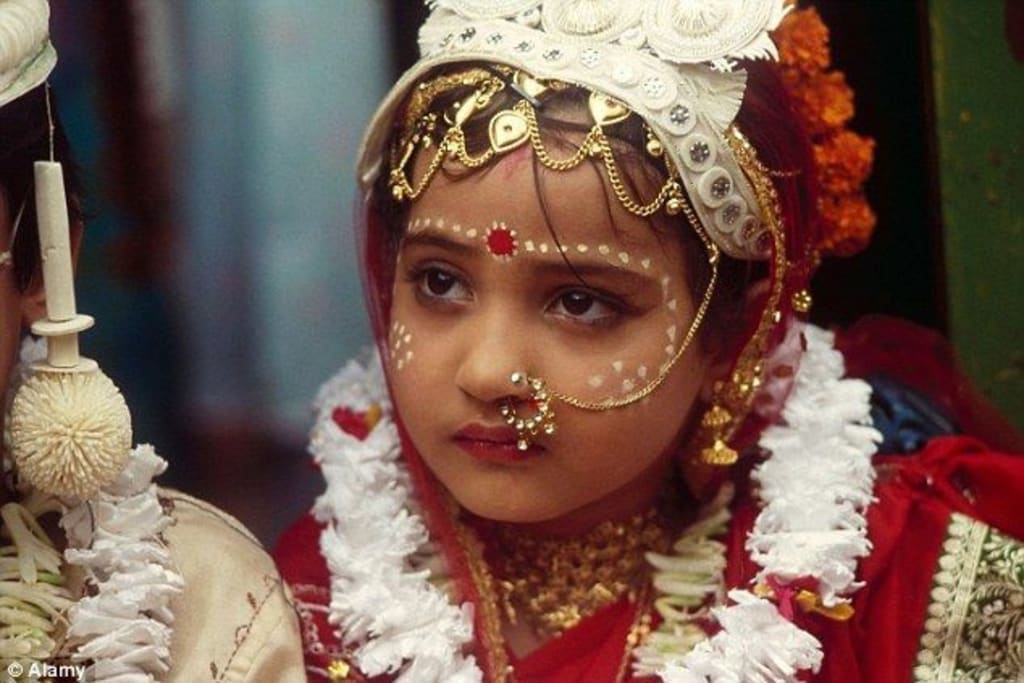
At the age of nine, Jiya received the news from her parents that she would be wedded, which was difficult for her to comprehend at first. Jiya had envisioned a future where she would attend school, socialize with her peers, and eventually pursue a career as an educator. Nevertheless, her impoverished farming parents from a small Indian village had alternative aspirations for her.
Jiya's parents utilized the services of a matchmaker to arrange her marriage, with the expectation that getting married at a young age would guarantee her future stability and elevate their family's prestige. Additionally, they were incentivized by the possibility of obtaining a dowry from the groom's family, which would enable them to settle their debts and enhance their standard of living.
Jiya was experiencing a sense of being confined and devoid of authority. She acknowledged that she was not prepared for wedlock since she had not completed her primary education and lacked proficiency or insight that would assist her in fulfilling the duties of a wife. She attempted to implore her parents, conveying that she was still too youthful and desired to pursue her education. Nevertheless, her parents were unreceptive to her pleas, affirming that getting married was in her best interest and the family's.
Jiya was adorned in a red and gold sari and seated on an embellished stage during her wedding day. She felt like an object on exhibition, as everyone gazed at her and made remarks about her looks. Her prospective groom, who was in his early twenties, appeared and pledged his vows to her in an unfamiliar language.
Jiya relocated to a modest dwelling in the adjacent town with her new husband and in-laws subsequent to the wedding. She experienced a sense of alienation in her own abode. At the beginning, her spouse treated her with kindness, but before long, his behavior towards her changed. Despite her young age, he imposed unrealistic demands on her, expecting her to perform all household duties, cook meals, and fulfill his sexual desires. Jiya was overcome with feelings of being overwhelmed and frightened by these sudden and daunting responsibilities.
Jiya's husband gradually turned violent towards her, resorting to physical abuse even for minor errors or mishaps. Jiya found herself in a vulnerable and isolated state, with no sources of assistance or guidance to turn to. She longed for the company of her loved ones, her friends, and her familiar life, but she was aware that returning to them was not an option.
Child marriage is still a widespread issue in India, despite being prohibited by law. Girls like Jiya face similar circumstances due to deep-rooted cultural and social norms, poverty, and gender inequality. According to UNICEF, approximately 27% of girls in India are married before they turn 18, and 7% are married before they turn 15. This practice has severe consequences for the physical, emotional, and cognitive development of young girls. For instance, child brides are at a higher risk of experiencing domestic violence, pregnancy complications, and lifelong poverty. This problem is multi-faceted and requires a comprehensive approach that addresses the root causes.
Efforts to put an end to the practice of child marriage in India encompass a range of initiatives, including advocating for girls' education and empowerment, raising community awareness through campaigns, and providing girls with support and protection to enable them to flourish. The government has also introduced legislation and policies aimed at addressing this issue, such as the Prohibition of Child Marriage Act and the Beti Bachao Beti Padhao program. Despite these measures, there is still a lot of work to be done to eliminate this detrimental practice and ensure that young girls, such as Jiya, are not subjected to exploitation and abuse. Further action is needed to create a safe and healthy environment for young girls to grow up in, and to provide them with the necessary resources to reach their full potential. It is crucial to continue to promote gender equality and invest in girls' education to combat the harmful effects of child marriage in India.
Note: This is a global issue.
About the Creator
Lily
I'm Lily. a storyteller with a passion for crafting tales that inspire and captivate. Join me for stories that will take you on a journey you'll never forget.






Comments
There are no comments for this story
Be the first to respond and start the conversation.